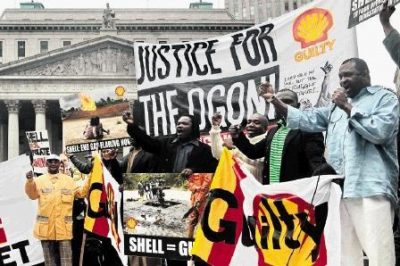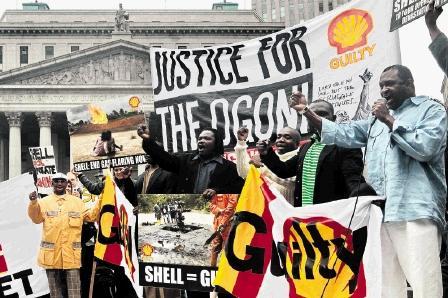The Supreme Court heard arguments in a crucial case yesterday that could have major ramifications for corporate accountability.

Nigerian protesters against Shell. Photo by OilChange International.
A dozen Nigerian citizens, all granted political asylum in the United States, filed the lawsuit. These refugees include victims of torture and people with relatives who were executed. The suit is named after Esther Kiobel, the widow of one of the victims. The court’s conservative justices, who are in the majority, indicated that they may opt to side with the corporations, the Los Angeles Times reports.
To get a firm grasp of the importance of this case, please read this op-ed that Peter Weiss published last week in The New York Times. Weiss, a human rights law expert, pioneered efforts to use the Alien Tort Statute as a way to try the perpetrators of human rights crimes committed abroad in U.S. courts. In the commentary, he wrote:
If the Supreme Court rules in favor of Royal Dutch Shell and against the plaintiffs, multinational corporations — particularly in mining and other extractive industries — could draw the lesson that it is now safer to forge alliances with autocratic regimes that have poor human rights records because they will not be judged culpable in the way individuals can be.
Today, the Times‘ online edition features a debate about corporate and human rights. It includes an essay by Vincent Warren of the Center for Constitutional Rights (CCR), who argues that since corporations obtained “extensive rights,” in the Citizens United ruling, “now we must enforce their responsibilities.”
Weiss is CCR’s vice president and a former chair of the Institute for Policy Studies board of trustees. His op-ed concludes with a comparison of Citizens United and Kiobel:
The Supreme Court has “an extraordinary choice to make, in juxtaposition to its previous ruling in Citizens United: whether to accept an argument that, in effect, leaves corporations less culpable than individuals are for human rights violations committed abroad — or whether to hold that if a 200-year-old law can be used to hold individual violators to account, it can be used against corporate violators as well.
A decision affirming that Shell should go unpunished in the Niger Delta case would leave us with a Supreme Court that seems of two minds: in the words of Justice John Paul Stevens’s dissent from Citizens United, it threatens “to undermine the integrity of elected institutions across the nation” by treating corporations as people to let them make unlimited political contributions, even as it treats corporations as if they are not people to immunize them from prosecution for the most grievous human rights violations.
A more startling paradox is difficult to imagine.
Emily Schwartz Greco is the managing editor of OtherWords, the Institute’s non-profit editorial service.
